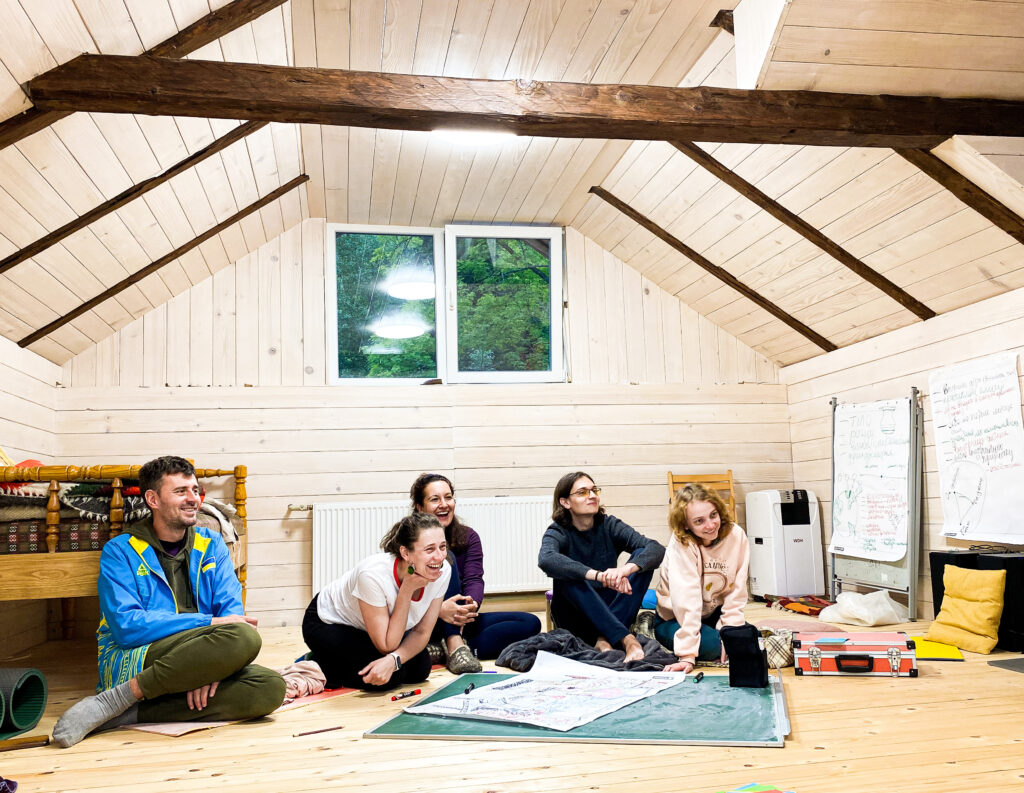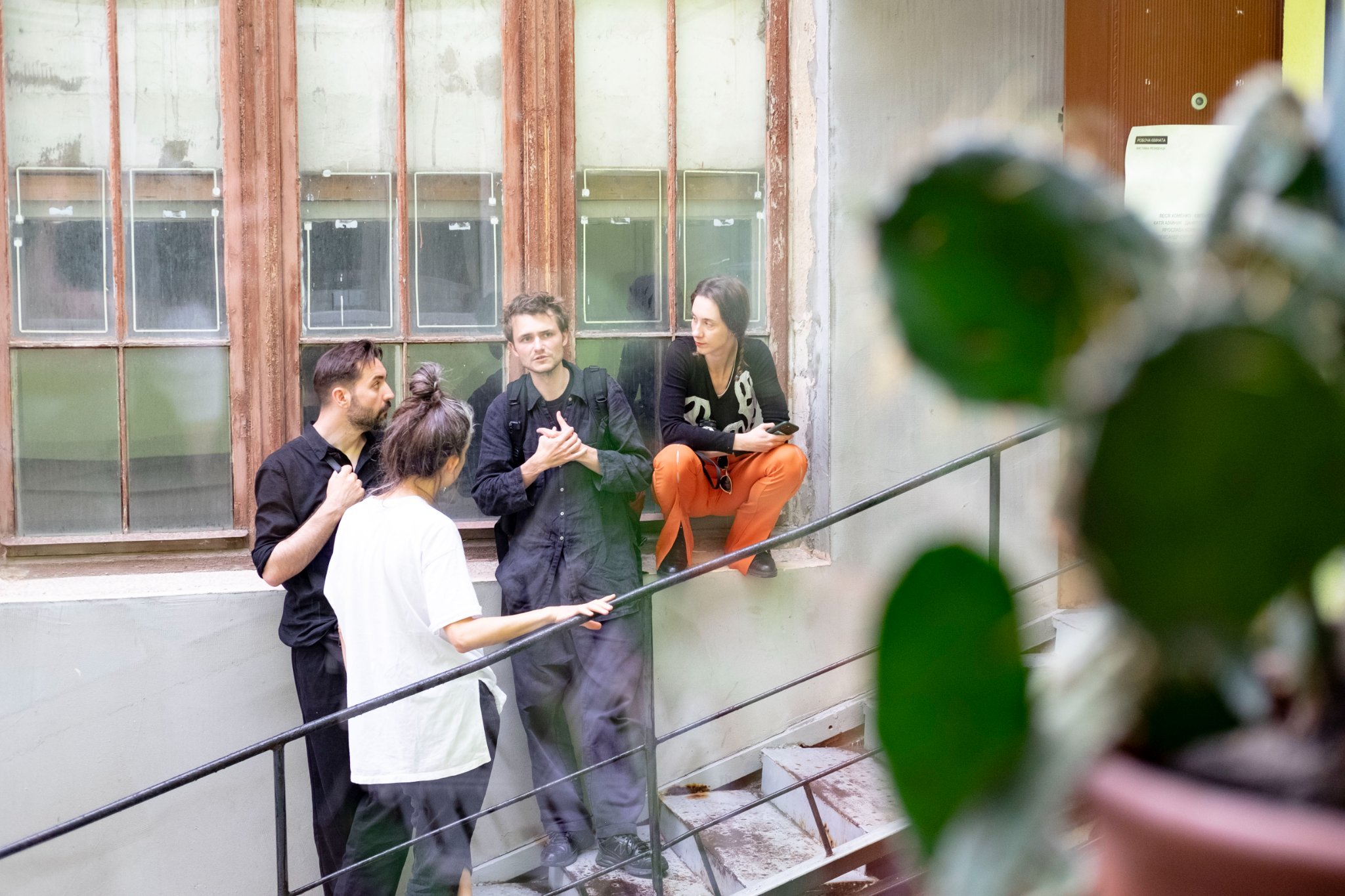
At the end of the summer, the TRANSLATORIUM residency was held in the village of Babyn, Ivano-Frankivsk region. Ten translators worked on their projects, communicated with each other, and recovered to return to their professional life with renewed strength. They also discussed how their profession had changed over the past six months of living under martial law. Tania Rodionova, a curator of the residency, shares her impressions.
By the curator
On February 24, the entire Ukrainian creative sector shuddered, along with residential buildings and infrastructure objects (it’s incredible how quickly these phrases from the news entered our everyday speech). Because what can culture, and in the case of translation, texts do, when rockets and bombs are falling on us? It turned out that they can do quite a lot.
I clearly remember the moment when I realized that I could be more useful on my usual front because everyone can sort humanitarian aid, but not everyone can inform foreigners about what is happening in our country. I have this specialty at my disposal, so I must use it.
Suddenly, everyone needed something to be translated: news, lists of medicines, appeals, instructions for equipment to build combat checkpoints… and later, poems.
«Tania, we need a person who will tell us about bulletproof vests in Croatian… Tania, is there anyone who could translate into German during the operation online?…» — the community that we built for years suddenly became so effective and united, and most importantly, in demand and respected. The translator’s work has gained new visibility, for which we fought for so long.
But it is worth saying that delineating one’s front in one’s head is marked by proximity to the war. So and in no other way. I put my fiction translation projects on hold, and it is still hard to get back to them.
What are the classics of the 20th century for? Who needs them now? Texts about war, just written somewhere between explosions and bomb shelters, or sent directly from the front are quite a different story.
This is how war poetry came to me. Texts by poets I knew, which appeared on the network, seemed to give me an impetus, and I kind of created tasks for myself: this is what I need to translate into English so that we are heard abroad, and this should be done right now.
Unexpectedly, I realized that the more emotionally difficult the text, the better I feel after translating it. A kind of strange catharsis. Some texts were especially painful, causing physical sensations. This is what happened to me translating Yurii Bondarchuk’s poem Dima about the deaths in Mariupol — I suddenly felt a pinch in my back.
Once again, I was convinced that translation is the most attentive reading. And paraphrasing this common thesis, I would say that translation today is the most painful reading. Because every text passes through you, gets stuck in your chest, pinches your back, and never misses your heart.
How can we explain this emotional inability to translate anything that is not related to war? How much longer will this last? How (and is it possible?) to return to the profession fully, as it was before February 24?
It was with these questions that we conceived the residency because we understood that the majority of the Ukrainian translation community faces similar challenges and internal obstacles.

What residents say about how translation has changed for them
For many, these six months have become a constant internal struggle with themselves, a search for motivation to do what seems to have no meaning now. Participants of the TRANSLATORIUM residency repeatedly said that they have problems with motivation: it is difficult for them to translate texts that do not contain the theme of war. And when someone dares to do ‘detached translations’ of, say, children’s literature, they unexpectedly see anti-tank hedgehogs and caterpillar tracks in the texts. This is the logic of war, this is how war captures our thoughts, even when we do not want it. It turns out that any text is a potential trigger. And its translation turns into wandering through a long labyrinth of meanings and breaking through thickets of traumatic experience.
On the other hand, some find translating fiction a kind of therapy. However, it seems, there are few of them. This practice makes it possible to abstract (albeit for a short time) from increasingly sad news. Quite a good plan, isn’t it? However, there are other consequences here: translators may feel guilty for doing such work. And so, we again return to the internal struggle with ourselves. Is this guilt justified? Of course not.
Such kind of work has the right to exist even in times of war because sometimes we have to read novels about love and children’s fairy tales.
Can we learn to overcome it? That’s hard to say.

After February 24, the Ukrainian cultural community implicitly agreed on the cancellation of Russian culture, that is, refusals to participate in joint events with Russians, publications in joint anthologies, etc. This is a positive practice, which, however, gives rise to a certain kind of paranoia: one has to be twice as careful and always check everything. And this also applies to the translation profession, because maximum attention to texts appears here. Isn’t there anything about ‘great Russian culture’?
Imagine: you start translating a work by a respected foreign author, but suddenly you see admiration for Dostoevsky and Tolstoy in the text.
Of course, this does not diminish the quality of the text and may not show the position of the author themselves, but it can definitely cause conflicting feelings among Ukrainian readers today. And, as practice shows, it is not the publishing house responsible for producing a bad text that is often criticized, but for some reason, it is the translator. Here the question arises: should the translator resort to a kind of self-censorship because of this? That is, filter orders from this point of view and reject those where such ‘risks’ are possible. In a conversation with the residents, we concluded that translators could in such cases add a preface with their position regarding the reading of similar texts in today’s context.
A significant shortening of the planning horizon has become another feature of life for Ukrainians after February 24. We, Ukrainians, were not distinguished by a long-term vision before, but now this horizon has been shortened from several months to a few days. Accordingly, this is also reflected in the translation activity. Usually, translators work on a book for a period from 3 months to a year, or even longer. Now, many are afraid of such ‘long’ book projects, because they don’t know what will happen tomorrow, or whether they will even have the opportunity to work. Added to this fear of planning is the uncertainty of whether the publishing house will eventually be able to publish the book or whether its priorities will change. This sense of the futility of one’s work also causes internal conflict. Is there an answer to these challenges of the new reality? Hardly.

Interestingly, we are used to thinking about translation as bringing foreign contexts into our own culture and explaining the world to ourselves. Now, we explain ourselves to the world more often. There are more and more orders and needs to translate from Ukrainian into other languages. And this is a radical change that seems to help us interpret ourselves on the stretch between the source and the target language.
“For me, translation used to be, first of all, about being interested in the Other. But now, it is rather about trying to explain yourself to the world, become more visible, and establish a dialogue. But, of course, only where this dialogue and understanding are actually possible,” says Roksolana Sviato, a translator and a member of the residency, sharing her experience.
Actually, the world’s interest in us is the source of motivation for many translators today.
«In times of war, translation is a tool of struggle for culture. This is an opportunity to enrich Ukrainian with the international, and vice versa. This is a chance to find new meanings to replace those that have been lost,» says Olha Svyripa, a translator and a member of the residency.
Today, translation, like culture, is the front of our struggle. And the sense of the community’s unity, the long-awaited visibility, and our usefulness allow us, translators, to overcome our internal warnings and continue to fight:

The project was implemented with the support of the European Union and the International Renaissance Foundation within the framework of the EU4USociety initiative.
Photos by Nadiia Kuryliak and Taras Telishchak


